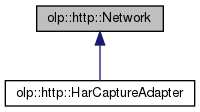An HTTP client abstraction. More...
#include <Network.h>
Inheritance diagram for olp::http::Network:

Classes | |
| struct | Statistics |
| Network statistics for a specific bucket. More... | |
Public Types | |
| using | Callback = std::function< void(NetworkResponse response)> |
| The callback that is called when the request is processed or canceled. | |
| using | HeaderCallback = std::function< void(std::string key, std::string value)> |
| The callback that is called when a header is received. | |
| using | DataCallback = std::function< void(const std::uint8_t *data, std::uint64_t offset, std::size_t length)> |
| The callback that is called when a chunk of data is received. | |
| using | Payload = std::shared_ptr< std::ostream > |
| The request and response payload type. | |
Public Member Functions | |
| virtual SendOutcome | Send (NetworkRequest request, Payload payload, Callback callback, HeaderCallback header_callback=nullptr, DataCallback data_callback=nullptr)=0 |
| Sends the network request. | |
| virtual void | Cancel (RequestId id)=0 |
Cancels the request associated with the given RequestId. | |
| virtual void | SetDefaultHeaders (Headers headers) |
| Sets the default network headers. | |
| virtual void | SetCurrentBucket (uint8_t bucket_id) |
| Sets the current bucket statistics. | |
| virtual Statistics | GetStatistics (uint8_t bucket_id=0) |
| Gets the statistics for a bucket. | |
Detailed Description
An HTTP client abstraction.
Member Function Documentation
◆ Cancel()
|
pure virtual |
Cancels the request associated with the given RequestId.
When the request is canceled, the user receives a final callback with an appropriate NetworkResponse marked as canceled as illustrated in the following code snippet:
auto response =
.WithRequestId(id)
.WithBytesDownloaded(download_bytes)
.WithBytesUploaded(upload_bytes)
.WithError("Cancelled");
A network response abstraction for the HTTP request.
Definition NetworkResponse.h:62
NetworkResponse & WithRequestId(RequestId id)
Sets the ID of the associated network request.
NetworkResponse & WithBytesUploaded(uint64_t bytes_uploaded)
Sets the number of bytes uploaded during the associated network request.
NetworkResponse & WithBytesDownloaded(uint64_t bytes_downloaded)
Sets the number of bytes downloaded during the associated network request.
NetworkResponse & WithStatus(int status)
Sets the HTTP response code.
NetworkResponse & WithError(std::string error)
Sets the human-readable error message if the associated request failed.
- Note
- If the provided
RequestIddoes not match any pending requests, no operations will be performed, and no callbacks will be called.
- Parameters
-
[in] id The unique ID of the request that you want to cancel.
Implemented in olp::http::HarCaptureAdapter.
◆ GetStatistics()
|
virtual |
Gets the statistics for a bucket.
By default, it returns the statistics for the default bucket and the ID that equals 0.
- Parameters
-
[in] bucket_id The bucket ID.
- Returns
- The statistic for the requested bucket.
◆ Send()
|
pure virtual |
Sends the network request.
- Parameters
-
[in] request The request that is sent. [in] payload The stream used to store the response payload data. [in] callback The callback that is called when the request is fully processed or canceled. After this call, no more callbacks are triggered, and you can consider the request as done. [in] header_callback The callback that is called when an HTTP header is received. Each HTTP header entry results in a callback. [in] data_callback The callback that is called when a chunk of data is received. You can trigger triggered multiple times before the final Callbackcall.
- Returns
SendOutcomethat represents either a validRequestIdas the unique request identifier or anErrorCodein case of failure. In case of failure, no callbacks are triggered.
Implemented in olp::http::HarCaptureAdapter.
◆ SetCurrentBucket()
|
virtual |
Sets the current bucket statistics.
- Parameters
-
[in] bucket_id The bucket ID.
◆ SetDefaultHeaders()
|
virtual |
Sets the default network headers.
Default headers are applied to each request passed to the Send method. User agents are concatenated.
- Parameters
-
headers The default headers.
The documentation for this class was generated from the following file:
- olp-cpp-sdk-core/include/olp/core/http/Network.h